Lowell Week in Review: April 2, 2017
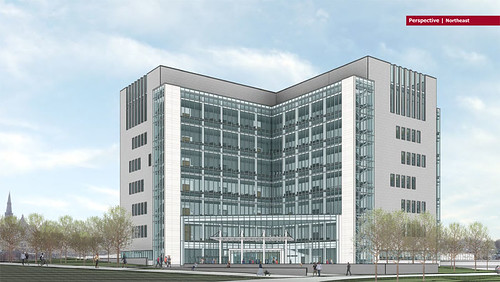
Entrance to Lowell Justice Center, from Jackson St looking towards Lord Overpass
Lowell Justice Center
On Wednesday of this past week, a representative of the state agency that is overseeing the work on the Lowell Justice Center visited Middlesex Superior Court to give a briefing on the status of the new Lowell Justice Center. He said that construction is proceeding on schedule, with the excavation finished and the foundation being poured. The building will be up and enclosed by the end of 2017. Interior work will begin after that with a late 2019 completion still expected.
The building is L-shaped with a two-story glass entrance atrium, and a two-story annex on the rear of the building. That annex contains parking for judges on the upper level and prisoner delivery and shipping/receiving areas on the lower level.
The building will be 7 stories tall with a mechanical shed on top. There will be 17 courtrooms. The state hopes to have it certified as LEED Platinum.
- Basement level will contain a prisoner detention area and a locker room for employees
- First floor has the entrance atrium, the jury pool, the registry of deeds, the district attorney’s office and the library/court service center.
- Second floor has District Court clerk and probation space and two courtrooms.
- Third floor is also District Court, with four courtrooms, three hearing rooms, and a judicial office suite
- Fourth floor is Juvenile Court with clerk and probation space, three courtrooms, and the juvenile clinic
- Fifth floor is Probate Court with clerk/register of probate space and two courtrooms
- Sixth floor is Housing Court with one courtroom (which will only be used one day per week); plus two probate courtrooms.
- Seventh floor is Superior Court, with clerk and probation space and three courtrooms
The entrance atrium will have public art reflecting Lowell’s history and heritage etched on its glass walls. The artist is an Englishman (I didn’t catch his name) who has installed public art in airports and transportation centers in Europe and the US. There were “not many” submissions by local artists. The exact layout and content of the art is to be determined.
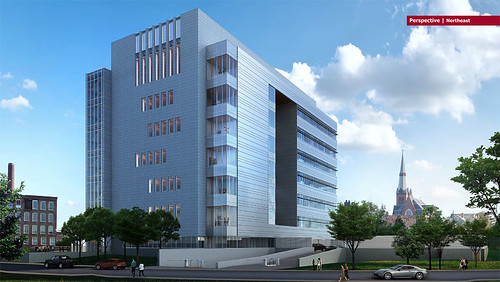
Lowell Justice Center from Jackson St. Mill No. 5 to right. Eliot Church in background.
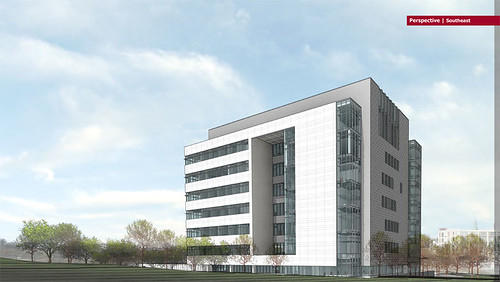
Lowell Justice Center from Middlesex Street, looking towards Dutton Street
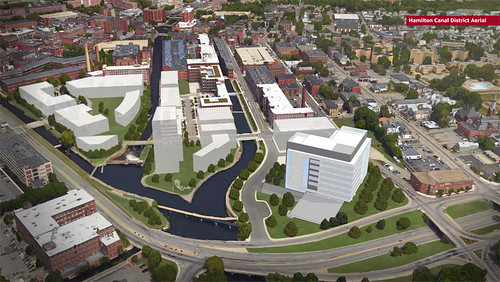
Built-out Hamilton Canal District with Lord Overpass and Justice Center in lower right. All proposed buildings shown in white.
UMass Lowell and Lowell
Later in the day on Wednesday, UMass Lowell historian Bob Forrant gave the annual Distinguished University Professor lecture. When I wrote about that event on Thursday (Bob Forrant: Distinguished University Professor), I set aside a couple of Lowell-centric items for today.
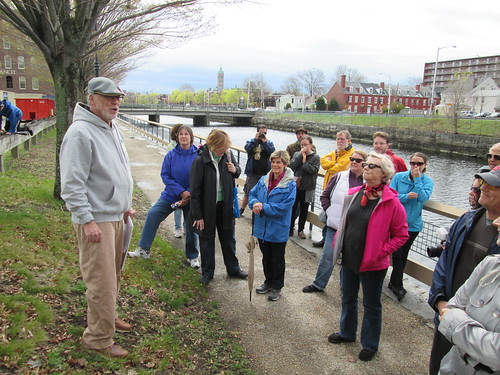
Bob Forrant leading walk on Urban Renewal for Lowell Walks, April 2016
In his talk, Bob called for the creation of a UMass Lowell Innovation Hub for the humanities, fine arts, and social sciences, a place where people in those fields could collaborate among themselves and with members of the community to tackle some of the biggest issues that plague Lowell like housing, joblessness, education, substance abuse, and many others.
At the reception after the talk, I approached Bob and commended him for that suggestion and offered my assistance. To that he responded, “Why don’t we put it in the Superior Courthouse after you move out?”
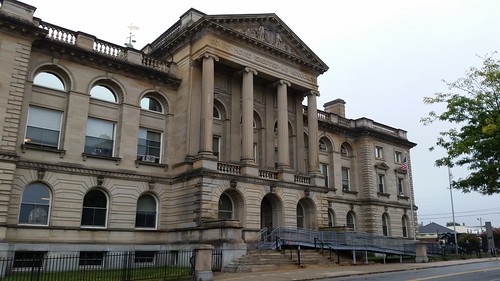
Middlesex Superior Courthouse
I thought that was a brilliant idea, especially since I had learned earlier in the day that with the Justice Center on schedule, the Superior Courthouse will soon be vacant. Once that happens, the building could be had by UMass Lowell at no acquisition cost, is fully accessible, has onsite parking, and is in move-in condition for such an enterprise. Yes, there will be cries of “But it won’t pay any taxes” but at least it would be occupied and used productively. The alternative might be a vacant building that will suffer “demolition by neglect” when no private developer is interested in it. The building is perfectly suitable for institutional use, but with its mammoth courtrooms and 20 foot ceilings, converting it to residential use would be a challenge.
In his speech, Bob also paid homage to the “but they don’t pay taxes” chorus. While first acknowledging valid community concerns that the “ever-expanding campus, like the Blob in that old-time horror film, appears interested in ingesting whole neighborhoods,” he went on to criticize “reflexive resentment among some in Lowell” which he linked to a broader trend in American politics – a “national culture of disrespecting expertise and facts.”
To counter this attitude of “reflexive resentment” towards UMass Lowell, Bob recalled that when he first came to the University in 1996, the HBO program “High on Crack Street: Lost Lives in Lowell, Massachusetts” had just premiered, casting as negative an image on the city as one could imagine. Yet since then, the city and its reputation has “emerged phoeinix-like, with UMass Lowell playing a catalytic role in that transformation.”
In one paragraph of his lecture, Bob listed all the ways in which the University assisted the city, and why that collaboration attracted him to this place and has kept him so involved in the community:
“The University fostered the enhancement and protection of the historical fabric of the community, supported K-12 and continuing education, and worked to strengthen the social and cultural life in our region. Faculty worked across disciplines and colleges, an interdisciplinary graduate program in regional economic and social development started, students got involved as community researchers, and relationships strengthened between regional actors and the University. Emphasis was placed on figuring out how to better involve the social sciences and humanities in the economic and social development process. When I arrived in 1994 this effort was well underway. A former community and union organizer, I’d found a great home and engaged in this sort of work ever since.”
In the question and answer session that followed the lecture, Bob was asked to elaborate on the resentment some in the city expressed towards the university and suggest how the university might keep itself from being closed off from the community. He answered that “if you consider the location of the campus, there’s no getting around that we’re in the city and the residents of the city are our neighbors.” He said it’s important for the university to introduce its students to the city, its history, and the people who live here. “They were here first and will be here after most of the students leave, and it’s important to respect them.”
But then Bob disputed the notion that the city receives nothing in return for the services it provides to the university. He said those who say that do not recognize all the contributions of the university. He spoke passionately about the “work our students do in the community” and said that is extremely valuable even though there is no way to put a price tag on it. He also said we at the university “sometimes think we have all the answers,” but as long as we build solid partnerships with groups like the Coalition for a Better Acre, we will be able to better relate to the community.
Bob partly attributed the city’s negativity towards the university to local politics:
“Many on the city council are out of touch with the reality of the city. The political system lets them keep getting reelected even though they don’t reflect the city. Hopefully that system will change.”
Aggressive Panhandling
We haven’t heard much about “aggressive panhandling” in Lowell recently. Maybe that will come as the weather improves. There was talk of a kick off for the “give your change for change” campaign, which urges residents to donate in a variety of ways to agencies that help the homeless rather than giving cash directly to panhandlers.
The city of Worcester recently received the bill for last year’s effort to counter “aggressive panhandling.” As reported on masslive.com by former Sun reporter Melissa Hanson, the city of Worcester must pay $519,489 in legal fees to the lawyers who represented three Worcester residents in challenging the legality of two panhandling ordinances enacted in 2015. Both were quickly declared unconstitutional by a U.S. District Court, and legal fees have now been awarded.
One of the ordinances made it unlawful to “beg, panhandle or solicit in an aggressive manner” while the other prohibited hanging out on a traffic island or roadway (which is where many panhandlers position themselves). In awarding the fees, Judge Timothy Hillman found that the litigation “was an important case which raised and decided important issues of public concern.”
Hopefully Lowell sticks to attacking the underlying causes of panhandling and avoids the expensive Constitutional minefield of attacking panhandling itself.
City Council Agenda
The Lowell City Council meets this Tuesday at 6:30 p.m. Here are the motions on the agenda for that evening:
- Councilor Elliott – Request City Manager provide a report regarding federal funding loss due to cuts noting the impact on staff as well as the number of people in the community affected by the cuts.
- Councilor Elliott – Request City Council recognize Peter Kostoulakos for his contributions to restoring Mayoral portraits at Lowell City Hall.
- Councilor Elliott – Request City Council vote to place ballot referendum question on Lowell High School Building project and discuss question: Do you support funding Lowell High School Building project?
- Councilor Elliott – Request City Manager provide report regarding all tax delinquents in the City, and the potential for another lien auction
- Councilor Leary – Request City Manager provide an update regarding the EDA sign off on the Hamilton Innovation District’s new bridge and infrastructure updates.
- Councilor Leary – Request City Manager provide status of public records request pursuant to MGL Chapter 66 sect. 10 to City of Lowell requesting copies of any inspections and results for air quality annual inspections and hazardous abatement at Lowell High School.
- Councilor Leahy – Request City Manager provide a report regarding condition of Willard Street between Humphry and Beacon Streets.
- Councilor Leahy – Request City Manager provide a status report regarding construction on Lawrence Street Bridge.
- Councilor Samaras – Request City Manager have Law Department outline procedures on eminent domain cases, to include all steps taken before and after proceedings.
- Councilor Samaras – Request City Manager develop an outline which lists pros/cons to each school site to include an explanation of which steps need to be and are being taken to ameliorate any problems at the four chosen sites, ie. Article 97; bus costs/timeline; wetlands; sidewalks; traffic; and asbestos.
- Mayor Kennedy – Request City Manager take the necessary steps to have Swan Street repaved.
- Mayor Kennedy – Request City Manager have the Parking Department look for a parking solution at the intersection of Eleventh Street and Beacon Street.
Angkor Dance Troupe’s 30th Anniversary
The Angkor Dance Troupe will celebrate its 30th anniversary next Friday night (April 7, 2017) with an event at Sompao Meas Hall, 450 Chelmsford Street in Lowell. The event will feature a cocktail hour from 6 to 9 pm with performances that look back on the group’s 30 year history. This will be followed by “dancing and celebration.” Tickets are available online from MKtix.
Lowell Walks 2017 Kicks Off Next Saturday
The 2017 season of Lowell Walks kicks off next Saturday (April 8, 2017) at 10 am from the Murkland School at 350 Adams Street (behind St. Patrick’s Church). I will lead this walk which will last 90 minutes and will cover the North Common and the surrounding neighborhood.
The full schedule for Lowell Walks is available on this website’s calendar.
Thank you for all the important work you do!
The city ought to start planning in a comprehensive manner for the area around Central/Gorham Street in which the soon-to-be vacated judicial buildings are located. I’d include Central Plaza in the study area. There was some talk of including the area in the JAM Plan back in the day, but they ultimately decided to stick to the west side of Gotham/Central. This is a real opportunity.